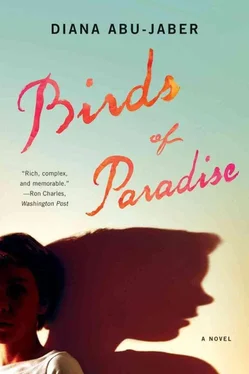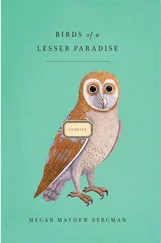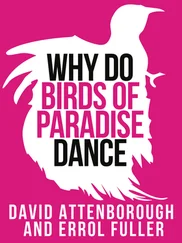BRIAN AND STANLEY NEVER found their way back to that early closeness, the time of the gingerbread house. Felice was born, a Miami angel: it was as if the perfumed air and sifting fronds had pervaded his and Avis’s genes and given them this unbearably lovely, worthless child. Is that what he really believes? Brian rubs at his jaw. Yes: worthless . His son’s presence had a heaviness, an unasked question. There was usually a dusting of flour in Stanley’s hair, along the ridges of his knuckles. If Brian offered to take him fishing, Stanley was always game. They went on day excursions to Key Largo,
Lauderdale-By-The-Sea. But he’d head right back to the kitchen when they got home, saying, “I’d better check on the starter,” or slap on the hot water and start loading the heap of pots and pans into the washer.
Neither of them had interest in organized sports. Brian grieved over this: sports gave men a way to talk to one another: a language to smooth one’s path through life. Brian had suffered without that language. He’d imagined taking his son to soccer practice, baseball tryouts; he’d planned to cultivate an interest in whatever activity his son took up. He hadn’t counted on the son he got. After Felice left home, Stanley moved outdoors as well. He started an herb garden, then expanded, building raised beds with clean blond planks of wood, planting stringbeans, eggplant, and Brussels sprouts. He dug up swathes of the backyard for leafy greens and purples and reds, and grew a type of lettuce that was filigreed in blood-red, as if a circulatory system ran through it.
He rarely spoke to his parents — perhaps he’d blamed them for Felice’s disappearance. Brian recalls one early evening, home from work, when he’d gone to the kitchen for a snack (they no longer ate together) and he found Stanley with his arms immersed in suds, the air smudged with mist. Stanley looked almost beatific, his eyes like glass, as if he’d been at prayer. Brian hesitated just as Stanley turned.
“Hey — uh — just thought I’d grab myself something.”
“Let me.” Stanley withdrew from the sink, shaking off his hands. “I haven’t been to the store yet — there isn’t much.” By the time he was seventeen, Stanley had taken on the grocery shopping and food preparation. He made them stews, pastas, salads filled with the crisp vegetables from his garden. Brian was surprised that such tomatoes and onions grew in the dirt behind his house — that his son would know what to do with them. Stanley heated some refried beans, dropped a scoop of butter into a skillet and let it foam. He cracked eggs into a bowl, whisked in a dollop of heavy cream. “So, Dad.” Stanley spilled the eggs into the sizzling butter. “Something I’d wanted to talk to you about.”
Brian pulled up one of the tall stools by the counter. “All ears. What’s up?”
Stanley gave him a bright, alert glance. “Nothing bad. It’s just — you know I got into UM, right?”
Brian nodded, avoiding Stanley’s eyes. Brian had attended Brown and Cornell Law. As had his own father. But Stanley’s grades were mediocre, his attendance sporadic. And Avis wanted to keep him close; neither Brian nor Avis had encouraged Stanley to apply out of state or given him advice on other schools. It was this — the lack of ambition for his son — that deviled Brian even more than their lack of time together. “Yeah — it’s great, Stan. I’m proud of you,” Brian said. “That’s a very solid school.”
“Well, I hope you’ll still be — because the thing is, I decided I don’t actually want to go to college.”
Brian stiffened. “Oh?”
“I mean — I think I really want to start a business.” Stanley stirred the eggs, the wooden spoon tilted in his hand, a steady oval of motion. “I don’t need school.”
Brian’s eyes ticked up at the kitchen: Brazilian hardwood floors, counters reflecting tiny, embedded ceiling lights, sleek white porcelain cake pedestals with thick glass covers. They’d poured nearly $200,000 into the remodel, retrofitting Avis’s kitchen to professional grade. Stanley thinks this is what it means — what running a business is. “The grocery store?” Brian tried to sound sincere and neutral.
“I know I want to start a business.” Stanley’s voice grew hotter as he stirred. “I’ve got investors lined up. My friend Jason Perez says he’s in — and Mrs. Gregerson, my old boss at Winn Dixie? She’s very interested.”
“Well, you know, the business school at UM—”
“Dad, wait — just listen. The whole organic lifestyle thing is everywhere these days, right? There are entire stores that are just organic food and vegetarian. Really committed to natural, alternative approaches.”
Brian’s eyes were now trained on the stirring. They’d had this conversation — in pieces — over the years. Stanley took a class in History and Deconstruction in ninth grade — the stuff they taught in schools! He’d started reading Noam Chomsky, Theodor Adorno, Ralph Nader for crying out loud. Stuff Brian didn’t even want to read in college . The more Stanley read, the more intense he became. Brian tried to reassure himself it was just part of the evolution of adolescence. When Stanley started on Diet for a Small Planet, he became insufferable — quoting statistics on the environmental damage caused by a meat-based diet, giving diatribes on the imperialist legacy of the big-food industry, the plight of grape pickers in California, coffee growers in Sumatra, sugarcane haulers in Cuba. At seventeen, Stanley was fired from his job as a bag boy at Milam’s for smuggling discarded cheeses, crackers past their sell-by dates, and dented cans to homeless shelters and missions. Brian had been mortified. He drove to the store and told the manager that Stanley’s sister had disappeared a few months earlier and that Stanley had been struggling. The man watched Brian with a doubtful, grave frown, straightening the tie under his apron. Finally he agreed not to press charges as long as Stanley never reentered the store. Brian found himself repeatedly offering the same explanation to a series of teachers and employers.
The eggs looked molten, ivory-yellow wavelets closing behind the sharp lines of the spoon. “I don’t like school, Dad. It’s never been right for me — you know that. I’m not like you that way.”
Meaning what? Intellectual? Cold? Out of touch? Brian drew a slow, tense breath.
“I mean, I wish I were, but I’m not — I don’t get the school thing. But I do know business.”
“I thought businesses were all part of the corporate hegemony,” Brian said softly, trying to stave off the sharpness he felt. Stanley gave him another of his bright looks: Brian realized his son was terribly anxious.
“Well — yeah, usually they are. But my deal would be different. The employees would all be part-owners. It’s basically the co-op model but grown up. With better food and more variety. You don’t have to be a member or volunteer or buy, like, the spotted, moth-eaten fruit. The co-op sells this vegan cheese that tastes like tires. Forget it. You just pay the money and our produce will be just as pretty as the stuff at Publix. There’s nothing even close to it around here, Dad!” he said in a passionate burst, his eyes shining with the kitchen lights. “I’ve researched this. Tons of people want to eat clean and healthy but they don’t want to go into places like co-ops — they’re too small…”
“And grubby, and depressing.” Brian crossed his arms, his suit jacket pleating into the inner creases of his elbows.
“Sure, yeah. I guess they can be.”
“So…” Brian felt the archness enter his voice — the way he’d circle in a summary statement at a hearing. “All these Miami doctors and attorneys, driving their Lexuses and Maseratis — they’ll have a place to buy the nice healthy food they’ve always wanted.”
Читать дальше












